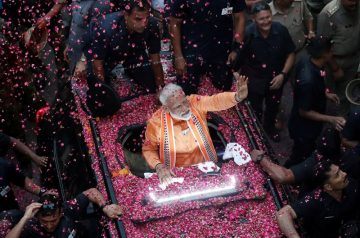
Aatish Taseer in Time:
Populists come in two stripes: those who are of the people they represent (Erdogan in Turkey, Bolsonaro in Brazil), and those who are merely exploiting the passions of those they are not actually part of (the champagne neo-fascists: the Brexiteers, Donald Trump, Imran Khan in Pakistan). Narendra Modi belongs very firmly to the first camp. He is the son of a tea seller, and his election was nothing short of a class revolt at the ballot box. It exposed what American historian Anne Applebaum has described as “unresolvable divisions between people who had previously not known that they disagreed with one another.” There had, of course, been political differences before, but what Modi’s election revealed was a cultural chasm. It was no longer about left, or right, but something more fundamental.
The nation’s most basic norms, such as the character of the Indian state, its founding fathers, the place of minorities and its institutions, from universities to corporate houses to the media, were shown to be severely distrusted. The cherished achievements of independent India–secularism, liberalism, a free press–came to be seen in the eyes of many as part of a grand conspiracy in which a deracinated Hindu elite, in cahoots with minorities from the monotheistic faiths, such as Christianity and Islam, maintained its dominion over India’s Hindu majority.
Modi’s victory was an expression of that distrust. He attacked once unassailable founding fathers, such as Nehru, then sacred state ideologies, such as Nehruvian secularism and socialism; he spoke of a “Congress-free” India; he demonstrated no desire to foster brotherly feeling between Hindus and Muslims. Most of all, his ascension showed that beneath the surface of what the elite had believed was a liberal syncretic culture, India was indeed a cauldron of religious nationalism, anti-Muslim sentiment and deep-seated caste bigotry.
More here.
